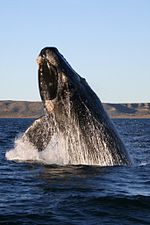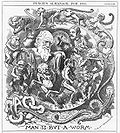It contains one species, Ambulocetus natans (Latin natans "swimming"), known solely from a near-complete skeleton. Ambulocetus is among the best-studied...
46 KB (5,680 words) - 02:59, 24 August 2024
Ambulocetidae is a family of early cetaceans from Pakistan. The genus Ambulocetus, after which the family is named, is by far the most complete and well-known...
7 KB (692 words) - 13:01, 16 December 2023
its family. Of the less than 10 fossils that have been described, one, Ambulocetus natans, is nearly complete and the main source of information concerning...
40 KB (3,619 words) - 19:19, 21 September 2024
Transitional fossil (section Pakicetids, Ambulocetus)
mammals. This arrangement does not give directional hearing under water. Ambulocetus natans, which lived about 49 million years ago, was discovered in Pakistan...
53 KB (5,701 words) - 23:36, 13 August 2024
Hans Thewissen (section Discovery of Ambulocetus)
transition of whales from land to water, including the discovery of Ambulocetus, Pakicetus, Indohyus, and Kutchicetus. In addition to his work on fossil...
30 KB (3,004 words) - 02:19, 5 June 2024
expedition in late 2006 failed to find any in the Yangtze River. (Eocene) Ambulocetus Himalayacetus Gandakasia (Late Eocene) Tutcetus Perucetus Basilosaurinae...
33 KB (2,413 words) - 02:20, 7 October 2024
to freshwater environments, as modern hippopotamuses are. The later Ambulocetus, was likely to have lived a much more aquatic lifestyle, with shorter...
31 KB (3,258 words) - 11:16, 5 November 2024
Artiodactyla Pakicetidae Pakicetus Nalacetus Ichthyolestes Ambulocetidae Ambulocetus Gandakasia Himalayacetus Remingtonocetidae Andrewsiphius Attockicetus...
15 KB (2,057 words) - 04:53, 5 November 2024
channeled vibrations from the jaw to the earbone which occurred with Ambulocetus 49 million years ago, a streamlining of the body and the growth of flukes...
135 KB (15,048 words) - 06:18, 2 November 2024
from the extinction, and mammalian diversity increased. Creatures like Ambulocetus took to the oceans to eventually evolve into whales, whereas some creatures...
147 KB (15,847 words) - 07:59, 3 November 2024
probably swam using undulatory movements like modern otters and most likely Ambulocetus. This mode of locomotion represents a transitional stage in whale evolution...
5 KB (499 words) - 07:28, 20 April 2024
Artiodactyla Pakicetidae Pakicetus Nalacetus Ichthyolestes Ambulocetidae Ambulocetus Gandakasia Himalayacetus Remingtonocetidae Andrewsiphius Attockicetus...
17 KB (1,761 words) - 21:29, 24 October 2024
S2CID 4356708. J.G.M. Thewissen; S.I. Madar & S.T. Hussain (1996). "Ambulocetus natans, an Eocene cetacean (Mammalia) from Pakistan". Courier Forschungsinstitut...
102 KB (10,183 words) - 12:35, 2 November 2024
OCLC 803522914. Thewissen, J. G. M.; Madar, S. I.; Hussain, S. T. (1996). Ambulocetus natans, an Eocene cetacean (Mammalia) from Pakistan. Courier Forschungsinstitut...
234 KB (22,717 words) - 18:26, 17 October 2024
hearing set-up that channeled vibrations from the jaw to the earbone (Ambulocetus 49 mya), a streamlined body and the growth of flukes on the tail (Protocetus...
108 KB (12,074 words) - 15:42, 16 September 2024
shorter femur (60–70%) distinguish Rodhocetus from the more primitive Ambulocetus. The convex posterior surface of the exoccipital, shorter cervical vertebrae...
13 KB (1,394 words) - 19:44, 5 July 2024
transition from land to sea dates to about 49 million years ago, with the Ambulocetus ("running whale"), also discovered in Pakistan. It was up to 3 m (9.8 ft)...
119 KB (13,153 words) - 20:29, 28 October 2024
Museum. 34: 220–38. Thewissen, J.G.M.; Madar, S.I.; Hussain, S.T. (1996). Ambulocetus natans, an Eocene cetacean (Mammalia) from Pakistan. Courier Forschungsinstitut...
14 KB (1,370 words) - 23:38, 22 July 2024
A. natans is an abbreviation that may refer to: Ambulocetus natans, a fossil cetacean Atractus natans, a snake Aponogeton natans, a flowering plant Alisma...
310 bytes (66 words) - 09:36, 17 December 2013
Skeleton of Ambulocetus natans, a stem whale...
59 KB (5,867 words) - 18:34, 28 September 2024
Artiodactyla Pakicetidae Pakicetus Nalacetus Ichthyolestes Ambulocetidae Ambulocetus Gandakasia Himalayacetus Remingtonocetidae Andrewsiphius Attockicetus...
12 KB (1,188 words) - 00:22, 1 October 2024
Sayed Taseer Hussain discover fossils of the amphibious whale ancestor Ambulocetus in Pakistan. 1996 — Li Yumin discovers a fossil of the theropod dinosaur...
16 KB (1,854 words) - 10:43, 18 July 2024
interface and going back and forth. However, Hans Thewissen, discoverer of Ambulocetus, has questioned these conclusions, suggesting that the smaller skeleton...
5 KB (474 words) - 08:29, 13 March 2024
derived family of early whales), but also shares several features with Ambulocetus (the type of Ambulocetidae, earlier more primitive whales), and, with...
5 KB (496 words) - 02:59, 31 August 2024
evolution of whales has been documented in considerable detail, with Ambulocetus, described as looking like a three-metre long mammalian crocodile, as...
164 KB (18,515 words) - 22:34, 23 October 2024
Artiodactyla Pakicetidae Pakicetus Nalacetus Ichthyolestes Ambulocetidae Ambulocetus Gandakasia Himalayacetus Remingtonocetidae Andrewsiphius Attockicetus...
15 KB (1,618 words) - 19:19, 21 September 2024
Artiodactyla Pakicetidae Pakicetus Nalacetus Ichthyolestes Ambulocetidae Ambulocetus Gandakasia Himalayacetus Remingtonocetidae Andrewsiphius Attockicetus...
7 KB (660 words) - 19:17, 13 November 2023
running and jumping. Hence pakicetids were most likely aquatic waders. Ambulocetus, which lived about 49 million years ago, was discovered in Pakistan in...
83 KB (9,845 words) - 13:38, 30 September 2024
Lucy (Australopithecus). Hans Thewissen, paleontologist who discovered Ambulocetus natans, which inspired the NEOMED mascot, Nate the Walking Whale. University...
12 KB (1,072 words) - 13:10, 27 October 2024
Artiodactyla Pakicetidae Pakicetus Nalacetus Ichthyolestes Ambulocetidae Ambulocetus Gandakasia Himalayacetus Remingtonocetidae Andrewsiphius Attockicetus...
59 KB (5,801 words) - 04:07, 24 October 2024

























